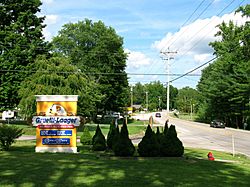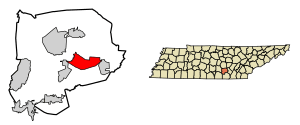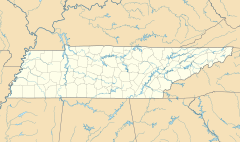Gruetli-Laager, Tennessee facts for kids
Quick facts for kids
Gruetli-Laager, Tennessee
|
|
|---|---|

SR 108 in Gruetli-Laager
|
|

Location of Gruetli-Laager in Grundy County, Tennessee.
|
|
| Country | United States |
| State | Tennessee |
| County | Grundy |
| Settled | 1869 |
| Incorporated | 1980 |
| Area | |
| • Total | 12.68 sq mi (32.83 km2) |
| • Land | 12.68 sq mi (32.83 km2) |
| • Water | 0.00 sq mi (0.00 km2) |
| Elevation | 1,919 ft (585 m) |
| Population
(2020)
|
|
| • Total | 1,742 |
| • Density | 137.43/sq mi (53.06/km2) |
| Time zone | UTC-6 (Central (CST)) |
| • Summer (DST) | UTC-5 (CDT) |
| ZIP code |
37339
|
| Area code(s) | 931 |
| FIPS code | 47-31490 |
| GNIS feature ID | 1648587 |
Gruetli-Laager (/ˈɡruːtli ˈlɑːɡər/ groot-LEE-_-LAH-gər) is a city in Grundy County, Tennessee, United States. In 2020, about 1,742 people lived here. As its name suggests, Gruetli-Laager is made up of two communities, Gruetli and Laager, which joined together to form one city.
Contents
History of Gruetli-Laager
How Gruetli Was Founded
The community of Gruetli was started in 1869 by people who moved from Switzerland. They spoke German. An organization called the Tennessee Kolonisation Gesellschaft helped set up Swiss communities on the Cumberland Plateau in Tennessee. Gruetli was likely named after a town in the Swiss region of canton of Glarus.
Peter Staub, who was part of the Swiss community in Knoxville, helped buy the first piece of land for Gruetli. This land was advertised in Switzerland. Many families who were having a hard time financially in Europe saw this as a chance for a new beginning.
Early Settlers and Challenges
More than 100 Swiss families moved to the Gruetli area in the 1870s. However, many were disappointed because the land was not very good for farming and it was quite far from other places. Because of this, many families moved to bigger cities nearby. Still, by 1880, Grundy County had the largest Swiss population in all of Tennessee.
Some important early settlers in Gruetli included Christian Marugg. He ran an inn along the road that stagecoaches used between Chattanooga and McMinnville. Another was Melchior Thoni, Jr. (1849–1926), who was a woodcarver. His artwork was shown in the old Governor's Mansion and a church in Nashville.
The Rise of Laager and the Merger
In the early 1900s, railroads were built in the hills east of Gruetli. These railroads were used to help with the many coal mining operations in the area. Laager began as a railroad stopover in 1918. It was first known as "Henley's Switch." Later, in 1980, Gruetli and Laager officially joined together to become one city.
Geography of Gruetli-Laager
Gruetli-Laager is located in the southeastern part of Grundy County. It sits on top of the southern Cumberland Plateau. This means it's about halfway between the plateau's edge that drops into the Sequatchie Valley to the east and another edge that drops to the Highland Rim to the west.
Just north of the city, the Collins River flows through a deep gorge called "Savage Gulf." The river then goes down the plateau to join the Caney Fork river near Rock Island.
Roads and Connections
Gruetli-Laager stretches for several miles along Tennessee State Route 108 (SR 108). This highway connects the city to the Sequatchie Valley and the Chattanooga area to the southeast.
Just west of Gruetli-Laager, SR 108 meets SR 56. This road connects the area to Monteagle and Interstate 24 to the southwest. It also connects to McMinnville to the northwest.
The United States Census Bureau says that the city covers a total area of about 32.5 square kilometers (about 12.5 square miles). All of this area is land.
Population and People
| Historical population | |||
|---|---|---|---|
| Census | Pop. | %± | |
| 1990 | 1,810 | — | |
| 2000 | 1,867 | 3.1% | |
| 2010 | 1,813 | −2.9% | |
| 2020 | 1,742 | −3.9% | |
| Sources: | |||
2020 Census Information
The table below shows the different groups of people who lived in Gruetli-Laager according to the 2020 United States Census. It helps us understand the different backgrounds of the city's residents.
| Race | Number | Percentage |
|---|---|---|
| White (non-Hispanic) | 1,660 | 95.29% |
| Black or African American (non-Hispanic) | 1 | 0.06% |
| Native American | 5 | 0.29% |
| Asian | 5 | 0.29% |
| Other/Mixed | 57 | 3.27% |
| Hispanic or Latino | 14 | 0.8% |
As of the 2020 United States census, there were 1,742 people living in the city. These people lived in 747 households, and 562 of these were families.
Images for kids
See also
 In Spanish: Gruetli-Laager para niños
In Spanish: Gruetli-Laager para niños
 | Bayard Rustin |
 | Jeannette Carter |
 | Jeremiah A. Brown |




